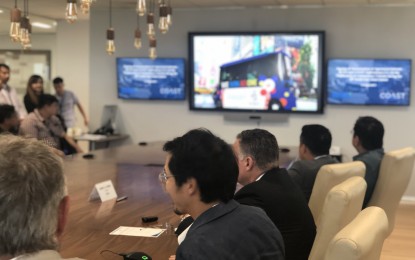
'GREEN' VEHICLES. Bases Conversion and Development Authority president Vince Dizon shows the model “green” shuttle to be used by athletes during the Southeast Asian Games (SEA Games) this year. A memorandum of agreement was signed by BCDA and Connected Autonomous Shared Transportation (COAST) on Tuesday (Aug. 13, 2019) for the deployment of three fully electric and autonomous or “self-driving” vehicles in New Clark City during the biennial meet. (Photo by Marna Dagumboy-del Rosario)
CLARK FREEPORT, Pampanga — Asia’s first “green” and innovative vehicles will ply the streets of the New Clark City come October for use by the South East Asian (SEA) Games athletes.
This, as the Bases Conversion and Development Authority (BCDA) and Connected Autonomous Shared Transportation (COAST) signed on Tuesday the memorandum of agreement (MOA) for the deployment of three autonomous fully electric and “green” vehicles in New Clark City to be utilized during the regional athletic meet.
Committed to developing a green and modern metropolis, BCDA president and CEO Vince Dizon and Coast Autonomous Chair and CEO David Hickey, led the signing ceremony held at the One West Aeropark Building, Clark Global City for the pilot testing of the three low-speed autonomous or “self-driving” vehicles.
In a press conference, Dizon said the vehicles that are fully electric and with zero carbon footprint are the first in Asia.
He said COAST will provide three electric Coast P-1 Shuttles at no cost to the government.
“This is truly a very exciting day. On behalf of CDA, I want to thank COAST Autonomous for working with us,” Dizon said.
He said the vehicles will run at a maximum speed of 60 kilometers per hour and will arrive in the country for the pilot testing ahead of the SEA Games.
“BCDA and COAST share the same vision for the future: cities must be liveable by removing traffic and connecting people with clean mobility options that put pedestrians first,” Hickey said.
Under the agreement, COAST will provide and use high-definition and 3D mapping machines to determine the route of each vehicle for it to operate on its own, and transport passengers to and from the Athlete’s Village, the Athletic Stadium and the Aquatics Center.
“COAST Autonomous has developed its vehicles to adapt to the appropriate speed for the environment,“ said Pierre Lefevre, COAST’s chief technology officer.
“The vehicles are not dependent on GPS (global positioning system) and thus, can operate in urban canyons created by tall buildings, under tree canopies and even underground or in tunnels. COAST’s Technology is highly flexible and makes cities and campuses more walkable. The future mobility should be connected, autonomous, shared and electric,” he added.
Clark will serve as the main hub during this year’s SEA Games, with the construction of world-class sports complex in the New Clark City.
There are 56 sports to be played in by nearly 10,000 athletes from 11 countries at the biennial event.
The 11 countries are Brunei Darussalam, Cambodia, Indonesia, Laos, Malaysia, Myanmar, Philippines, Singapore, Thailand, Timor-Leste and Vietnam. (PNA)
